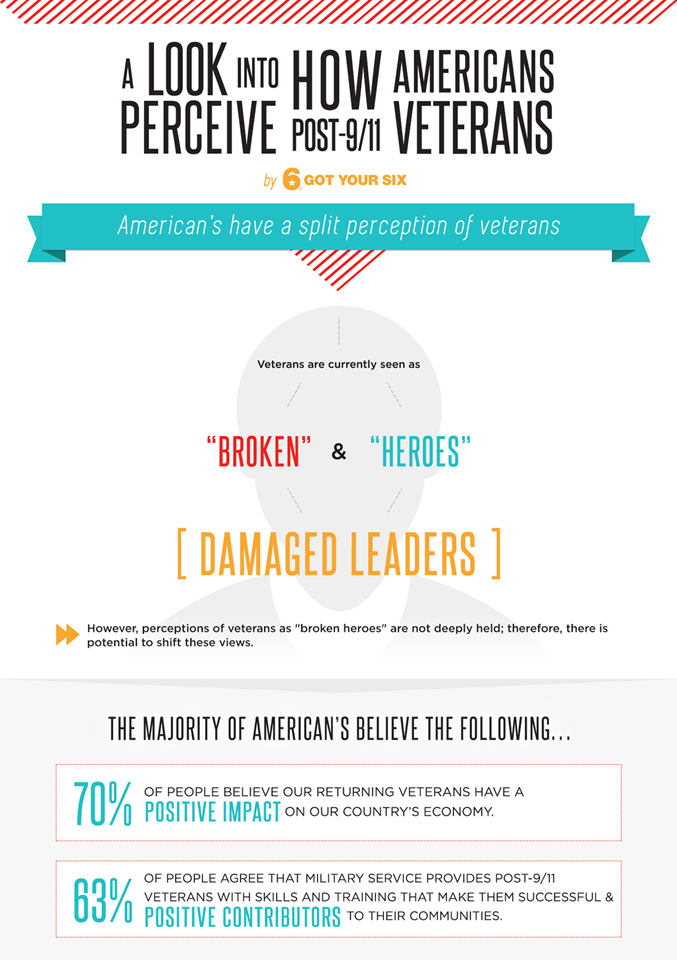What assumptions do you make when you encounter a homeless person?
According to a recent survey, when shown a photo of a man that appears to be homeless, one third of respondents label him as having a mental health issue. Nearly one-in-five believe that he has a criminal past. And, the second most popular response — after the 87-percent of people who identify the man as homeless—almost half of respondents label the homeless-looking person as a military Veteran.
Those who assume that a homeless man is a veteran are wrong nine times out of ten. According to the Department of Housing and Urban Development, Veterans account for less than 10 percent of the total U.S. homeless population.
On behalf of the Got Your 6 campaign, Greenberg Quinlan Rosner Research conducted an online survey in May 2014 of a representative sample of 1,381 adult Americans nationwide. The results demonstrate that perceptions of Veterans are starkly misaligned with reality. And this perceived notion of who America’s Veterans are is not only troubling but also can potentially have a negative impact reintegration.
If the average American is more likely to associate homelessness with veteran status than with mental health issues or a criminal past, what other negative stereotypes might our society hold about the men and women who have served our country?
The study also revealed troubling biases and cultural misconceptions about the health and employment status of returning veterans. For instance, more than 80 percent of Americans believe that post-9/11 Veterans are more likely than civilians to suffer from a mental health issue, and over 60 percent think post-9/11 veterans are more unemployed than civilians.
Here’s a reality check: according to the Bureau of Labor Statistics, Veterans have a higher employment rate than civilians 97 of the last 100 months. In fact, the current 12-month average unemployment rate for post-9/11 veterans is 7.8 percent, versus 8.2 percent for all civilians aged 18-44—a roughly comparable population set. The “Veteran unemployment crisis” that we’ve all read about simply doesn’t show up when the data is actually examined.
Mental health is a more complex issue. It may be true that combat Veterans, who more frequently encounter traumatic events, are more likely to deal with specific issues such as post-traumatic stress disorder. Because of this, many Americans view PTSD as an issue that is unique to the military and Veteran communities. But let’s put that in context.
According to the National Institute of Health, 7.7 million Americans deal with PTSD in a given year. The Department of Veterans Affairs estimates that between 300,000 and 500,000 service members have dealt with PTSD across twelve years of combat. Thus, conservatively, more than 95 percent of Americans with PTSD are civilians. Moreover, less than 10-percent of those who have served in the military since 9/11 have dealt with PTSD at any time—and many of them have fully recovered. PTSD is a human condition that sometimes affects Veterans, not the other way around.
In general, the survey revealed that Americans perceive most Veterans as “broken” or “damaged.” This has become the cultural norm. The results of predispositions like this are detrimental to veterans as they reintegrate and are damaging to a society that fails to recognize Veterans’ potential.
Unfortunately, cultural perceptions can be tightly held and difficult to shift. Looking for solutions, the survey explored the role of the entertainment industry and revealed that film and television play a pivotal role shaping the public’s perception of Veterans. Nearly half of the sample population reported that the entertainment industry has a strong influence on the way they perceive Veterans. And not surprisingly, when asked how Veterans are currently portrayed in film and television, respondents were more likely to say something negative than something positive.
The study showed that portraying veterans as “broken” on television leads the audience to believe that Veterans are broken in real life. However, depicting a Veteran as either a “hero” or in a neutral way elicits increased positive perceptions.
The big breakthrough was that the study showed that the rarely used neutral portrayal was actually more credible than the often-used hero portrayal. The neutral portrayal depicted veterans as everyday Americans who are assets to the community—images that are more in line with the data on the Veteran community. For respondents, this resulted in more and stronger positive feelings than even the hero depiction.
The other encouraging finding is that cultural perceptions of veterans aren’t necessarily deeply held. Initial impressions of the word Veteran led to very literal interpretations—such as “served in the military” and “defended our county.” This indicates that perceptions of veterans are not tied to strong beliefs and there are opportunities to shift current thinking.
Perhaps most importantly, respondents believe that a post-9/11 veteran is five times more likely to be a strong leader or a valuable community asset than an average comparable citizen. So, while the cultural perception of the damaged veteran prevails, Americans still see potential in those returning from military service.
The stereotypes and misconceptions that Americans hold for Veterans create a barrier for successful reintegration. Whether it occurs in a neighborhood, a workplace, a school, or a Hollywood writers’ room, we must begin to reshape the way we think and talk about Veterans.
On Veterans Day, we think about how you can help shift the conversation in America that will lead to more accurate perceptions of Veterans. A national narrative that helps Americans become less likely to relate homelessness, unemployment, and PTSD to Veteran status will empower those leaving the military and reintegrating into their communities. In the long run, the country will benefit and be strengthened by the increased leadership, team building, and problem solving skills that Veterans will inevitably bring home with them.

Topics in this story
More Stories
The Social Security Administration is hoping to make applying for Supplemental Security Income (SSI) a whole lot easier, announcing it will start offering online, streamlined applications for some applicants.
Yusuf Henriques, an Army Veteran and former combat medic, is the founder and CEO of IndyGeneUS AI, a genomics company on a mission to improve health equity by increasing representation of women and racial minorities in clinical trials.
Online shopping scams are the riskiest scam for Veterans, with 77.3% of reports confirmed losing money when targeted by this scam.








Veterans being homeless and also dealing with PTSD (those who are left untreated) is not what a first world country should go through but here we are and so I am glad this article is out there. and it says it all. The comments show the response this article has and I am glad this platform ha being created to point out exactly what is wrong and who is going through what. All the best and god bless to everyone who needs it. It is all I can say..
my brothers and sisters, please don’t lose interest in this website! If we lose interest, why should day continue to try and change things to improve our health care and treatment? I will say it again, don’t let them forget……..
WE ARE THE VETERANS IN THE Administration!!!
I’m a veteran with numerous veteran friends and acquaintances, the sad fact about trauma is that the military conditions personnel to overlook key triggers that there is an actual trauma… Not to mention the fact that many NCO’s and commissioned officers look down on soldiers that seek help while in the service, so this statement:
less than 10-percent of those who have served in the military since 9/11 have dealt with PTSD at any time
Is skewed because many veterans that suffer don’t report it and this doesn’t count the multitude of service members currently suffering…
I feel we all, veterans need to rally on washington DC . their are millions show our offices we need help. Will if we go in groups of 50 , 100 to our congressmen offices nonstop. Their home offices , Washington DC can u see 100000 vets knocking on their doors then go to the rally will government office wake up, and same time group visit our va hospital clinic demanding better health care.
And the VA goes around posting pictures portraying veterans as Oscar the Grouch. If you want to change the way people view veterans, maybe you should first change the way your own employees view (and treat) them!
Ma’am, you sound exactly like my wife! Thank you for standing by my brother and defending the rest of us.
Good article and I’am not a homeless vet. I seved 20 years in the Army and proud of it.
I agree 100 percent, and I’m glad someone is saying it. This cultural perception of homeless guys being veterans is all wrong. I’ve volunteered helping homeless folks for years, and I have found that a lot of this perception is propagated by the homeless person himself by falsely claiming to be a ‘veteran, need help’, wearing camouflage, etc. The vast majority of these guys were never in the service, and of those that were, only a small fraction are actually war veterans.
Thanks for saying it,
Paul Johnston
Iraq war veteran
After intensive training on How To Kill People.
After seeing, smelling and witnessing the horrors of War.
We Veterans were and are highly trained usually for one purpose.
We do our job, with out question or recognition.
What do you do with us when we come home.
Do you welcome us, sometimes Yes sometimes no (Vietnam Vets)
Now it seems no one knows what to do with these Highly Trained Soldiers when they come home. Their training has a limited job market and many unmarketable skills.
Their dedication to duty protecting you and your family has torn apart many of our families. It seems like no one cares, Veterans, Soldiers are becoming a burden to society.
No one knows what is required to keep this Great Nation safe, and more importantly who does that job, it is The U.S. Military and the Soldiers, Not God, Not The Politicians.
God Bless America
Harvey
with all respect to post 911 veterans, I will give credit to the VA for the reduction in PTSD among veterans. The younger veterans in today’s society are receiving much better care than the veterans that came home from Vietnam. I myself did not go to Vietnam, but I do remember the way the returning veterans were treated. The trauma for them did not end in Vietnam, the American people contributed to their trauma! Those brave men and women came home only to be spat on, called vicious names, denied jobs, etc… all because they were TOLD, not volunteered, to go into a foreign country and defend the very people that so visciously abused them upon their return.I respect every person that ever has or ever will serve their country, but the American people need to realize that things are better now because of those homeless mentally deficient veterans that protected them so many years ago!
All Americans do not even relate to the fact that more than ever women are serving and they don’t even think about the women–it’s always men. Homelessness isn’t just for men — I’m a Vet but in the world of Vets– I am obsure to the Nation as a Whole.
http://www.va.gov/vetdata/veteran_population.asp gives up-to-date info on male/female vets. I am a married female soldier with children and grand children and proudly served in 1990-94.
U know ur full of it. I was told. She can’t Ccc me no more it I could not turn pain off. I have nerve damage, scare tissue . u plug my meds no help withdraws u send vets places where can’t get help. It a run around. . what ur saying what uu Doing for veterans . wake up smell the coffee. (redacted by editor) is getting deeper . here.